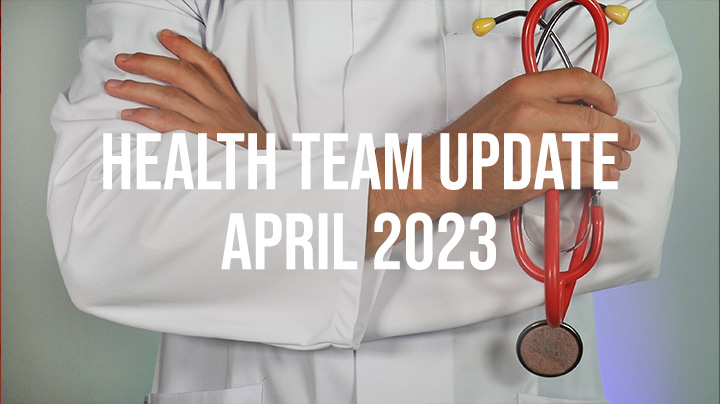Our Conference Health Team continues to provide us with timely and helpful updates for the well-being of our churches and communities. This month: Medicaid expansion, telehealth news, and COVID-19 updates.
Medicaid Expansion UPDATE & the SAVE Act
On March 27, 2023, Gov. Roy Cooper signed into law Medicaid expansion for North Carolina after 13 years of debate. This makes North Carolina the 40th state to adopt Medicaid expansion.
While this is a big step forward toward Medicaid expansion, it is important to know that expansion is not a done deal. Funding the expansion is part of a comprehensive state budget bill. The budget is a two-year spending plan but also contains major policies. The earliest that this approval could come is sometime in April, but more likely, the state budget will be approved this summer, closer to the end of the current fiscal year, on June 30th.
What can you do? You can educate yourself on and continue to advocate for Medicaid expansion to be included in the NC budget. You can help ensure that Medicaid expansion is not removed from the budget during upcoming budget negotiations. Keep advocating for Medicaid expansion until the budget is passed! Learn more at www.care4carolina.com.
It should also be noted that in the negotiation process, the SAVE Act was dropped from the legislation. The SAVE Act (HB 218/SB 175) is designed to allow Advanced Practice Registered Nurses (APRNs) to practice to the full extent of their training and education, bringing the state in line with national standards that at least 26 other states have already successfully adopted. The North Carolina Nurses Association (NCNA) supports this bill that would update APRN standards for the first time in 40 years. With the General Assembly’s expansion of Medicaid and extended coverage to an additional 600,000 North Carolinians, the existing provider shortage will be exacerbated. Research shows that bills like the SAVE Act can significantly help prevent unnecessary visits to Emergency Departments in the wake of Medicaid expansion, which has been a common challenge in other states. We encourage you to advocate for lawmakers to pick back up and move forward with the SAVE Act.
Beginning April 1, 2023, No Cost for MDLIVE Telehealth Services through 2024 for Conference Health Plan Participants
We’re excited to share that, as of April 1, 2023, there will be no out-of-pocket cost to use MDLIVE services (behavioral health or medical telehealth) for HealthFlex participants and dependents in any conference health plan through the end of 2024.
This no-cost access to behavioral health through MDLIVE allows you and your HealthFlex-covered dependents (ages 10 and over) to connect virtually with a licensed therapist or a board-certified psychiatrist for ongoing care.
For acute, non-emergent medical needs, MDLIVE is a fast, convenient option that can save you time and money. You and your HealthFlex-covered dependents can schedule virtual visits for common issues like the flu, allergies, ear problems, and more, now at no out-of-pocket cost.
- Primary participants can access MDLIVE for themselves and covered family members through benefitsaccess.org—no additional username or password is needed.
- Spouses enrolled in HealthFlex can access MDLIVE by logging into Virgin Pulse®, visiting the Benefits page, and searching “MDLIVE Telemedicine” to log in or register.
HealthFlex is able to offer MDLIVE at no cost due to a federal law that was recently passed allowing health plans to cover telehealth services before the deductible is met through 2024. This two-year extension is particularly helpful if you are enrolled in a high-deductible health plan paired with a health savings account.
COVID-19 Update
In a conversation this month with Dr. Wes Wallace, adjunct professor in emergency medicine at the UNC School of Medicine, Chapel Hill, we learned that COVID transmission levels are moderate to high in most NC counties, but community COVID levels are low. Why? Most of NC has a moderate transmission level, with some counties with a substantial transmission rate and a few with a high transmission rate. COVID is continuing to be spread locally at a moderate to high rate.
And yet vaccines, antibodies from previous cases of COVID, and diminished virulence of current COVID strains have resulted in lower hospital admissions. National COVID hospital admissions have shown a decline over the last 2 weeks. The vast majority of hospital admissions are among those greater than 70 years old. COVID continues to have a higher impact on seniors.
What can you do?
- Educate seniors on their COVID risk.
- If you are sick, stay at home or at least mask.
- Inspect the ventilation in your church spaces! You can invest in an air handling system for your church. Even just opening a door or window will greatly improve the air quality of your setting. This helps prevent COVID spread as well as other respiratory diseases such as the flu.
Also, the FDA & CDC have said that there will not be a second bivalent booster available until this fall. This is unlike what Canada & the United Kingdom are doing, where they are allowing an earlier bivalent booster for seniors & the immunosuppressed.
COVID-19 Coverage Changes for Conference Health Insurance
As of May 11, 2023, the government will officially end the COVID-19 public health emergency period. As a result, certain rules for healthcare coverage related to COVID-19 will also change.
For those on conference health insurance, specifically, after May 11, HealthFlex will no longer cover:
- COVID-19 testing at 100% (including at-home tests and tests performed at a doctor’s office, pharmacy, or other testing centers).
- In-network COVID-19 treatment at 100% before a participant reaches his or her deductible.
COVID-19 tests performed at a doctor’s office, pharmacy, or other testing centers, and treatment will all be processed according to regular HealthFlex plan benefits and subject to normal deductibles, coinsurance, and network rules. At-home COVID-19 tests will no longer be covered by HealthFlex.
All recommended vaccines and boosters administered by an in-network provider, or pharmacy will continue to be covered at 100%, including recommended COVID-19 vaccines and boosters.

